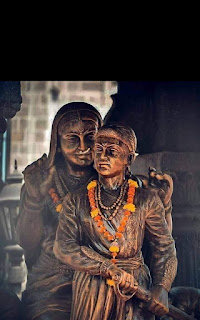Veer Mata Jijau-
She is remembered as a Symbol of Strength, Resilience, and Devotion, and is revered as a mother figure in the Maratha community.
Introduction
Jijabai was born on January 12, 1598, to Mahalasabai and Lakhuji Jadhav of Deulgaon, close to Sindkhed, in the current Buldhana district of Maharashtra. An respectable Maratha named Lakhoji Raje Jadhav. Jijabai married Shahaji Bhosale, a military commander working for the Nizam Shahi sultans and the son of Maloji Bhosale of Verul village, at a young age. She educated Shivaji about Swarajya and grew him up to be a fighter. Jijabai died on June 17, 1674.
 |
| Rajmata Jijabai essay |
Life and Works
Rajmata Jijabai (also known as Jijau
or Rajmata Jijau) was the mother of Maratha warrior King Shivaji Maharaj and
played a significant role in shaping his personality and career. Jijabai is
remembered for her strong character, Intelligence, and religious devotion. She
was deeply influenced by the Bhagavad Gita and the Hindu epic Ramayana, and
instilled in her son the values of duty, honor, and justice. She is credited
with teaching Shivaji the Importance of dharma, or righteousness, and
encouraging him to fight against oppression and injustice.
Despite
facing numerous challenges in her personal life, Jijabai remained an
influential figure in the Maratha court. She was known for her wisdom and
counsel, and was often consulted by her son on matters of state. She also
played a key role in securing the support of powerful Maratha clans and
chieftains for Shivaji's cause.
In
addition to her political and maternal responsibilities, Jijabai was also a
patron of art, literature, and culture. She supported the construction of
temples and promoted the study of Sanskrit and other classical Indian
languages. She was also a patron of the Bhakti movement, which emphasized
devotion to God and promoted social reform.
Jijabai's
life and contributions have been celebrated in Indian history and folklore. She
is remembered as a symbol of strength, resilience, and devotion, and is revered
as a mother figure in the Maratha community. In recognition of her
contributions, she has been honored with numerous memorials and statues in
India, including the Jijamata Udyaan, a botanical Garden in Mumbai.
Despite
the many challenges she faced, Jijabai remained a powerful force in the Maratha
court and played a crucial role in shaping the character and career of her son,
Shivaji. She is remembered as a devoted mother, a wise counselor, and a patron
of art, literature, and culture, and continues to be revered as an important
figure in Indian history.
Important Points
- Jijabai was born in the year 1602 in
a Deshastha Brahmin family in the town of Sindkhed, located in the present-day
state of Maharashtra, India.
- She was the daughter of Lakhujirao
Jadhav and Indira Bai, and was raised in a religious and cultured household.
- Jijabai was married to Shahaji
Bhosale, a Maratha general serving the Sultanate of Bijapur, in the year 1613.
- She had two children with Shahaji, including her son Shivaji and a daughter named Sakhubai.
- Jijabai is credited with influencing Shivaji's worldview and shaping his character. She taught him the principles of the Bhagavad Gita and the Ramayana, and instilled in him the values of duty, honor, and justice.
- Despite facing numerous challenges in her personal life, including periods of poverty and separation from her husband, Jijabai remained a powerful force in the Maratha court and was often consulted by her son on matters of state.
- Jijabai was also a patron of art, literature, and culture, and supported the construction of temples and the study of Sanskrit and other classical Indian languages.
- She is remembered as a symbol of
strength, resilience, and devotion, and is revered as a mother figure in the
Maratha community.
- Jijabai's contributions have been
recognized through various memorials and statues in India, including the
Jijamata Udyaan, a botanical garden in Mumbai, and the Jijau Balidan Sthal, a
memorial in Pune.








0 Comments